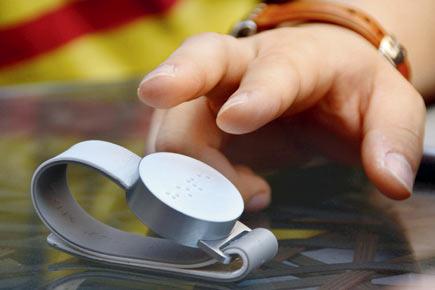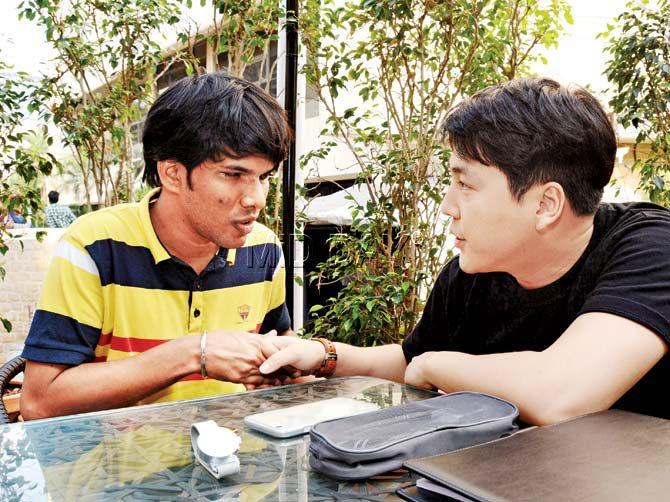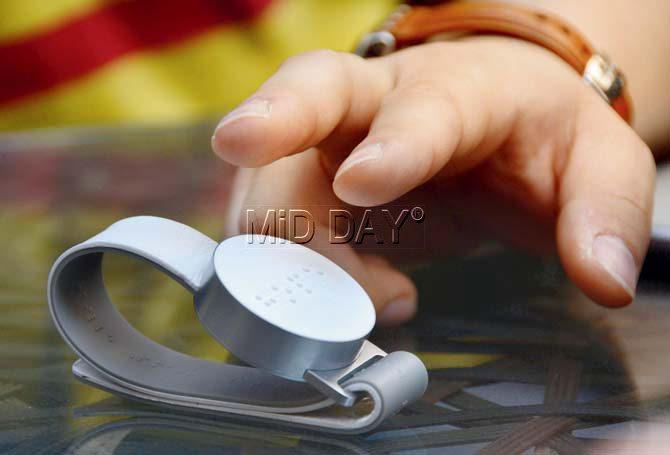Inventor of a smartwatch for the blind, Eric Ju Yoon Kim from South Korea, who is currently in Mumbai, talks telling the time, and getting a message from the GF with a potential 'customer'

Prathamesh Bendre, a Mumbai-based first year law student is visually-challenged. Curious and excited, he accompanied this reporter on an assignment, yesterday to the National Centre for the Performing Arts (NCPA), Nariman Point to meet Eric Ju Yoon Kim from South Korea, currently in Mumbai for the TedXGateway talks.
ADVERTISEMENT

Prathamesh and Kim in a discussion on the importance of keeping the tactile script alive. Pics/Satej Shinde
Kim is celebrated for his invention called ‘The Braille smartwatch’. This wrist wear can connect data from a phone via Bluetooth and transform messages and information into Braille. Kim, (25), met us at a cafe for this chat, his youth and baby-faced fresh looks throwing us in a loop. Not your stereotypical techno geek, Kim was dressed in a black t-shirt emblazoned with his company logo ‘Dot’ and jeans.

The Smartwatch does much more than tell time
Kim smiled in surprise as Prathamesh greeted him with a ‘Anyoung Haseyo’ which is a Korean for, “are you at peace?” He showed Prathamesh a demonstration watch explaining the finer points of his Dot. Prathamesh was wearing a Braille watch by an Indian watchmaker.
It cost Rs 900. Kim’s invention costs approximately Rs 20,042.62 (300 US dollars). Though it is not in Indian markets yet, it will be out in US this month. Kim told Prathamesh how the smartwatch worked, “Connect it to your phone and you can do so many things, read your messages, set alarms, keep track of where your Uber taxi has reached.”
Kim, was born in Inch eon (S Korea), and studied at the University of Washington (Seattle). He said, “I discovered religion, Christianity, in the US. I had a number of start-ups like the Wagon. Wagon was like an Uber service for trucks. It was not accepted and that made me turn to God.” earlier, he only believed in himself, claimed Kim, his fingers tapping madly at a keyboard.
Kim and Prathamesh communicated fluidly, with Kim emphasizing the importance of Braille over audio. “Audio compromises privacy. If you get a message on iOS from your girlfriend, for example, you had to listen to Siri read it to you in that voice, which is impersonal,” Kim explained. “Wouldn’t you rather read it yourself and hear your girlfriend’s voice saying it in your head?”
When he was asked if he has a girlfriend back home, Kim’s audio (volume) went a little low, “Yes, but we have not been together very long ...” he said as Prathamesh laughed. Kim spoke passionately about his drive to make public utilities Braille friendly and bring down prices of products.
As the sun pierced through the trees and the place started filling up for lunch, as the chat wound down, it was evident that Kim, the entrepreneur and Prathamesh the student, had their unique ways of looking at the world. For Kim, it was simple: even if audio is available, one should not do away with Braille.
For Prathamesh, it was, “It does not matter if you call us visually-impaired or blind. In fact, the latter is correct. The term does not matter, the treatment does.”
 Subscribe today by clicking the link and stay updated with the latest news!" Click here!
Subscribe today by clicking the link and stay updated with the latest news!" Click here!






